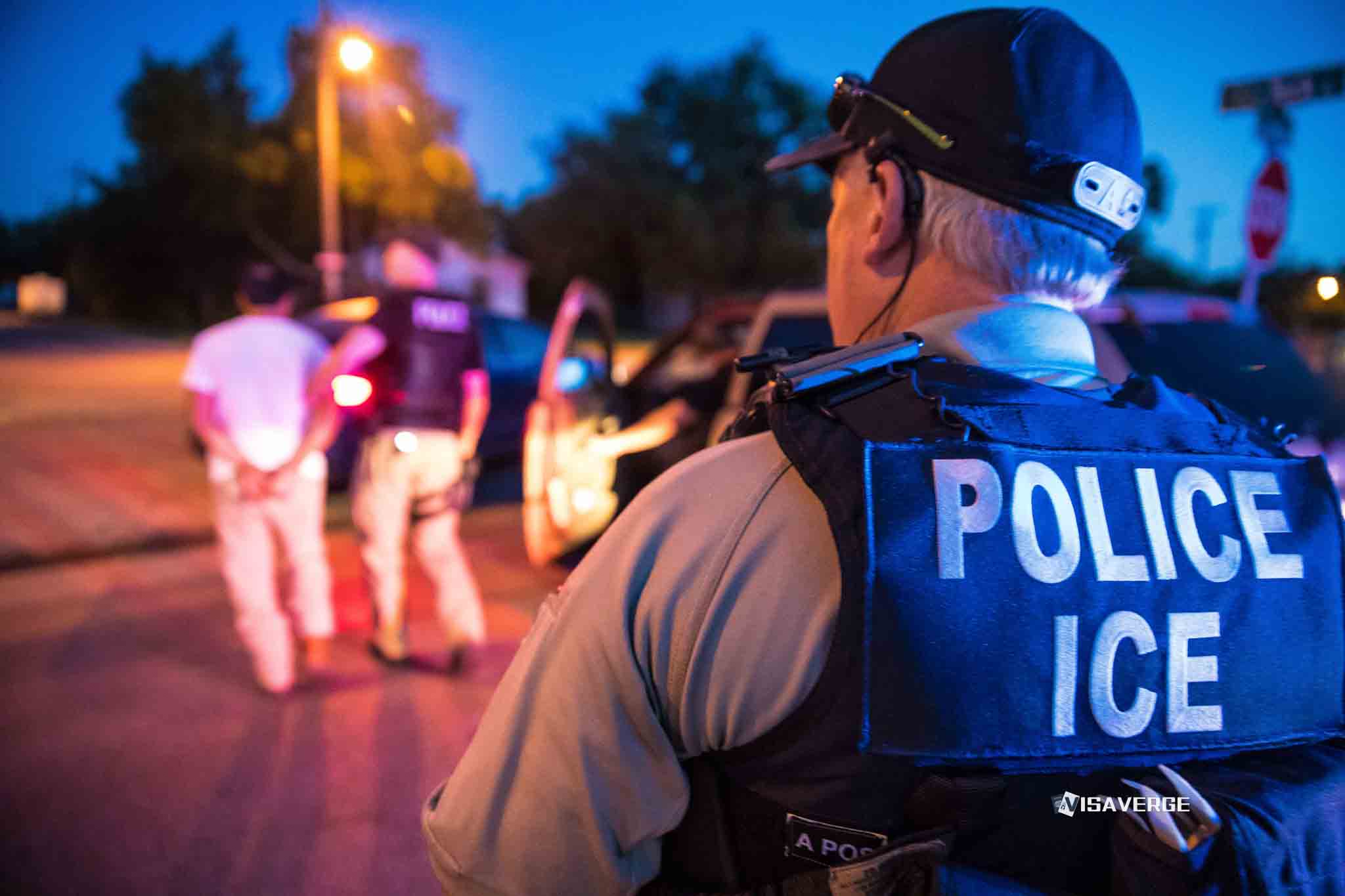Key Takeaways
• Luis Simon Acevedo-Rodriguez pleaded guilty to illegal reentry in Mississippi with three prior felony convictions.
• Illegal reentry carries penalties up to 10 years for prior felonies and up to 20 years for aggravated felonies.
• Operation Take Back America increased arrests and prosecutions under Trump’s 2025 immigration enforcement policies.
A Mexican national, Luis Simon Acevedo-Rodriguez, pleaded guilty in Mississippi to illegal reentry after being deported multiple times and having several felony convictions. This case, which unfolded in Rankin County, Mississippi, is part of a larger trend of aggressive federal enforcement against illegal reentry under the Trump administration’s 2025 immigration policies. The story of Acevedo-Rodriguez and others like him highlights the strict legal consequences for those who return to the United States 🇺🇸 after being removed, the impact on families and communities, and the ongoing debate over how the country should handle such cases.
Who, What, When, Where, Why, and How

On March 17, 2025, Border Patrol agents in Rankin County, Mississippi, arrested Luis Simon Acevedo-Rodriguez, a 32-year-old Mexican national. He admitted to being in the United States 🇺🇸 without permission and had already been deported three times before. Acevedo-Rodriguez also had three prior convictions: one for improper entry and two for illegal reentry. On June 13, 2025, he pleaded guilty in federal court to the charge of illegal reentry. He now faces up to 10 years in federal prison, with sentencing scheduled for September 8, 2025.
Acevedo-Rodriguez’s case is not unique. In the same week, other Mexican nationals were indicted or sentenced for illegal reentry in Florida, with some facing up to 10 years in prison and others already serving lengthy sentences. These cases are being prosecuted under a renewed federal push to crack down on illegal reentry, especially for those with prior criminal records.
The Law: What Is Illegal Reentry?
Illegal reentry is a federal crime under 8 U.S.C. § 1326. This law makes it a felony for anyone who has been deported or removed from the United States 🇺🇸 to return without special permission from the government. The basic penalty is up to 2 years in prison, but if the person has a prior felony conviction, the sentence can go up to 10 years. If the person has an aggravated felony (a serious crime like drug trafficking or violent offenses), the sentence can reach up to 20 years.
Key facts about illegal reentry penalties:
– Standard illegal reentry: Up to 2 years in prison
– With prior felony: Up to 10 years in prison
– With aggravated felony: Up to 20 years in prison
These penalties are set by federal law and are enforced by the U.S. Department of Justice, often in partnership with the Department of Homeland Security and local law enforcement.
Recent Enforcement and Operation Take Back America
The Trump administration’s 2025 immigration policies have brought a new wave of enforcement. Under Executive Order 14159, “Operation Take Back America” was launched to aggressively prosecute illegal reentry cases, target transnational criminal organizations, and increase cooperation between federal and local law enforcement. This operation has led to a sharp rise in arrests and prosecutions of people like Acevedo-Rodriguez.
According to Acting Chief Patrol Agent Adam Calderon of the New Orleans Sector, “There are consequences for those who continue to disregard our nation’s laws. If you are in the United States illegally… you will be caught, and consequences will be delivered.” This statement reflects the government’s tough stance on illegal reentry and its focus on deterring future violations.
How the Process Works: Step-by-Step After Apprehension
When a Mexican national or any non-citizen is caught reentering the United States 🇺🇸 after being deported, the process moves quickly and follows strict legal steps:
- Arrest: Border Patrol, Immigration and Customs Enforcement (ICE), or local police detain the person.
- Identification: Authorities check fingerprints and other biometric data against Department of Homeland Security (DHS) databases to confirm past removals and any criminal history.
- Charging: The U.S. Attorney’s Office files criminal charges under 8 U.S.C. § 1326 for illegal reentry.
- Detention: The person is held in federal custody while waiting for trial.
- Prosecution: The case goes to federal court. If the person has prior removals or convictions, the possible sentence increases.
- Sentencing: If found guilty or after a guilty plea, the judge uses federal sentencing guidelines to decide the length of the prison term.
- Removal: After serving the sentence, the person is deported again, usually with a permanent ban on returning.
This process leaves little room for relief or adjustment of status. Most people in this situation cannot apply for legal status or ask for special exceptions.
The Numbers: How Common Are These Cases?
Illegal reentry and related offenses make up about 60% of all federal criminal prosecutions in the United States 🇺🇸. On any given day, around 11,100 people are in federal prison for migration-related convictions, and about 13,600 are in pre-trial detention for these crimes.
In just one week in June 2025, at least two high-profile indictments and one guilty plea involving Mexican nationals were reported in Mississippi and Florida. These numbers show how common and serious these prosecutions have become.
Why the Crackdown? Policy and Political Context
The Trump administration’s 2025 immigration policies have made enforcement a top priority. The government argues that strict penalties for illegal reentry are needed to protect public safety, especially from people with criminal records. Project 2025, a broader policy plan, calls for even tougher border controls, expanded use of E-Verify (a system that checks if workers are allowed to work in the United States 🇺🇸), and harsher penalties for states and cities that do not cooperate with federal immigration enforcement.
Federal officials say these steps are necessary to deter illegal entry and keep communities safe. They point to cases like Acevedo-Rodriguez’s, where the person has a history of deportations and criminal convictions, as examples of why strong enforcement is needed.
Impact on Individuals, Families, and Communities
For the people caught up in these prosecutions, the consequences are severe. A Mexican national who is found guilty of illegal reentry faces immediate reinstatement of previous removal orders, criminal prosecution, and long prison sentences—especially if they have prior convictions. There is almost no chance for relief or to adjust their status.
For families and communities, the effects can be devastating. Many of those prosecuted have lived in the United States 🇺🇸 for years and have deep ties to their communities. Aggressive enforcement can separate families, especially those with mixed immigration status, and create fear and uncertainty among immigrant communities.
For local law enforcement, the new policies require more cooperation with federal agencies. Jurisdictions that do not comply with federal immigration enforcement can face penalties, including loss of funding. This has led to increased involvement by local police in immigration matters, which some community leaders say can damage trust between police and immigrant residents.
Multiple Perspectives: Legal, Advocacy, and Government Views
Legal Experts
Legal experts, such as those from the Immigrant Legal Resource Center, explain that illegal reentry is a serious federal crime, especially for those with prior deportations or felony convictions. They note that people in this situation have very few options for relief and face almost automatic removal after serving their sentences.
Advocacy Groups
Advocacy organizations like the National Immigration Forum and the Immigrant Justice Network have criticized the criminalization of migration. They argue that these laws disproportionately affect people of color and those with strong ties to the United States 🇺🇸. These groups are pushing for legislative reforms to decriminalize reentry offenses and focus on civil, rather than criminal, penalties for immigration violations.
Government Officials
Federal officials maintain that strict enforcement is needed to deter unlawful entry and protect public safety. They argue that people with criminal records who reenter the country pose a risk and that tough penalties send a clear message that the United States 🇺🇸 will not tolerate repeated violations of its immigration laws.
Historical Background: How Did We Get Here?
The crime of illegal reentry has been part of U.S. law since 1952, when Congress passed 8 U.S.C. § 1326. Over the years, penalties have increased, especially for those with prior criminal convictions. In recent years, prosecutions for illegal reentry have surged. Between 2017 and 2019, these cases increased by nearly 50%, and the numbers have stayed high under both President Biden and President Trump.
The Trump administration’s second term has brought even more aggressive enforcement, with new executive orders, expanded cooperation between federal and local agencies, and increased penalties for illegal reentry.
What’s Next? Future Outlook and Pending Changes
Looking ahead, the enforcement trend is likely to continue. Project 2025 and related executive orders call for even stricter rules, fewer options for relief, and more involvement by local law enforcement in federal immigration matters. Some of these new policies may face legal challenges, especially around due process and the rights of long-term residents and asylum seekers.
Advocacy groups are urging Congress to change the law and decriminalize unauthorized entry and reentry, but it is unclear if these efforts will succeed given the current political climate.
Real-Life Example: The Case of Juan Carlos Ruiz-Diaz
Another recent case shows how these policies play out. Juan Carlos Ruiz-Diaz, a Mexican national who had been removed from the United States 🇺🇸 six times and had two prior convictions, was indicted in Jacksonville, Florida, in March 2025. He faces up to 10 years in prison if convicted. This case, like Acevedo-Rodriguez’s, demonstrates the government’s focus on repeat offenders and those with criminal records.
What Should Affected Individuals and Families Do?
If you or someone you know is facing charges for illegal reentry, it is important to seek legal help right away. Most people in this situation will be held in federal custody and face quick prosecution. Legal aid organizations, such as the Immigrant Legal Resource Center and the National Immigration Forum, can provide information and support.
For official information on immigration enforcement and removal, the U.S. Immigration and Customs Enforcement (ICE) website (www.ice.gov) offers resources and contact details for those seeking help or more information.
Official Resources
- U.S. Immigration and Customs Enforcement (ICE): www.ice.gov
- U.S. Department of Justice: www.justice.gov
- U.S. Customs and Border Protection (CBP): www.cbp.gov
- Mississippi Homeland Security Task Force: Contact via Mississippi Department of Public Safety
- Legal Aid and Advocacy: Immigrant Legal Resource Center (www.ilrc.org), National Immigration Forum (www.immigrationforum.org)
Practical Takeaways
- Illegal reentry is a serious federal crime with harsh penalties, especially for those with prior removals or criminal convictions.
- Recent policy changes have increased enforcement, leading to more arrests, prosecutions, and longer sentences for Mexican nationals and others who reenter after deportation.
- Families and communities are deeply affected, with many facing separation and uncertainty.
- Legal help is critical for anyone facing these charges, as options for relief are very limited.
- The policy landscape is changing, with more restrictions likely and ongoing debates about the best way to handle illegal reentry cases.
Conclusion
The case of Luis Simon Acevedo-Rodriguez in Mississippi is just one example of a broader federal crackdown on illegal reentry by Mexican nationals and others who return to the United States 🇺🇸 after being deported. Under current law and policy, these individuals face swift prosecution, long prison sentences, and almost certain removal, with little chance for relief. The impact reaches far beyond the courtroom, affecting families, communities, and the national debate over immigration policy.
As reported by VisaVerge.com, the trend toward stricter enforcement is expected to continue, with more cases like Acevedo-Rodriguez’s likely in the months ahead. For those affected, staying informed, seeking legal help, and understanding the risks and consequences of illegal reentry are more important than ever.
For more details on the law and your rights, visit the U.S. Immigration and Customs Enforcement (ICE) official website.
Learn Today
Illegal Reentry → Returning to the US after deportation without permission, a federal felony under 8 U.S.C. § 1326.
Felony → A serious crime that results in harsher penalties, including longer prison terms under immigration law.
Operation Take Back America → A 2025 federal initiative to aggressively prosecute illegal reentry and target criminal organizations at the border.
E-Verify → An electronic system to check workers’ legal employment eligibility in the United States.
Aggravated Felony → A severe criminal offense such as drug trafficking or violent crime affecting immigration sentencing.
This Article in a Nutshell
Luis Simon Acevedo-Rodriguez’s guilty plea highlights severe penalties for illegal reentry, intensified by the 2025 federal crackdown under Operation Take Back America.
— By VisaVerge.com







